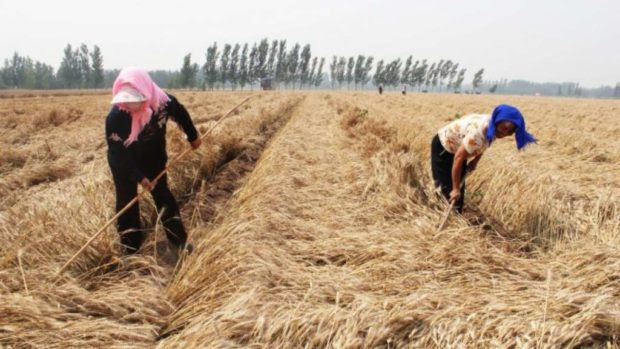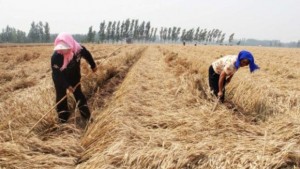Asharq Al awsat
Lahssen Moqana
Wheat being harvested in China’s Shandong province. AFP photo
The UN’s Food and Agriculture Organization (FAO) has expected Morocco’s harvest of wheat to increase from 2.7 million tons in 2016 to 7 million this year.
It also expected the 600,000 tons of barley harvested last year to reach 2.8 million in 2017.
After “poor and erratic rains” last year, “prospects for the 2017 harvest look very promising,” FAO said in a report.
“While parts of Morocco suffered from autumn drought up to mid-November 2016, which delayed plantings in some areas, good precipitation later in the season replenished soil moisture, improving yield prospects,” it said.
Moroccan dams cover only 15 percent of its agricultural land, with rainfed agricultural production accounting for 85 percent of aggregate output, said the report.
Good precipitation later in the season replenished soil moisture, improving yield prospects. The total area planted with winter cereals in the current season is 5.11 million hectares, compared to 3.6 million hectares in the previous year, it said.
According to the report, Morocco’s cereal imports in 2016/17 (July/June) are forecast at 9.1 million tons. A larger increase in import requirements was limited by ample carryover stocks from the previous year’s above average harvest.
European Union and Black Sea countries supply most of the common “soft” wheat, while Canada is the traditional supplier of “durum” wheat.
As part of the expected increase in harvest this year, FAO said that the government has announced the increase of the import duty on “soft” wheat from 30 percent to 135 percent.
The report added that food inflation in Morocco is limited, recording a 1.8 percent decrease in March last year.
The government subsidizes more than 1 million tons of the “national flour”, a common wheat of standard quality used to make flour for the low income consumers but the “durum” wheat market is not regulated.








